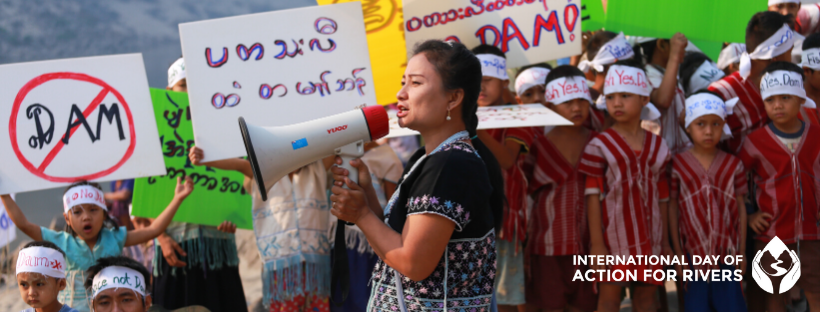Rivers and Indigenous Peoples

March 14th is the Int’l Day of Action for Rivers. On this day, let us link arms in the defense of our rivers and our ranks.
Only one third of the world’s rivers remain free flowing. The UN’s World Meteorological Organization (WMO), reports show that 50% of global river catchment areas are faced with abnormal conditions, leading to reduced water availability.
For Indigenous Peoples, this equates to a constant risk of losing their source of food, livelihood, and cultural practices. Lives of countless communities, Indigenous knowledge, and our rich biodiversity are threatened to be washed away by a great flood of false solutions, corporate plunder, and militarism.
Dams and hydropower projects remain to be a milking cow for the ruling elite as this provides the benefit of monopolizing energy production and forces markets to rely on them for agriculture, water consumption, and other industries– and thus further influence in politics and economy.
The well-being of our rivers is directly tied to the well-being of our peoples, communities, economy, and cultural practices. We are seeing the rapid acceleration of the climate crisis and how this has been affecting our day to day lives in the last decade. The lack of action from state actors, false solutions peddled by the corporate elite, and the violent repression of river activists collectively contribute to the swift depletion of our rivers.
Stop the attacks against river defenders:
40% of River Defenders under attack are Indigenous Peoples
In the course of carrying out our mass struggles and campaigns against the widespread destruction of our rivers, land-grabs, and imperialist plunder, we are faced with the challenge of heightened fascism and militarism.
A study released in 2018 by the ICTA-UAB showed that in the 220 environmental conflicts relating to dam and hydropower projects, 40% of river defenders under attack are Indigenous Peoples.
In 2024, it was revealed that fossil fuel lobbyists have been pushing for the creation of anti-protest laws in the United States aimed at deterring Indigenous-led activism against oil pipelines and expansion that threaten the health of rivers. Indigenous peoples have been leading the charge against these projects in the United States. The Dakota Access Pipeline in particular has been protested for its environmental toll, including the contamination of the Missouri River, putting clean water supply at risk and threatening sacred sites of Indigenous Peoples.
July last year, Indigenous lawyer and activist Ebo Mili was arrested in India, and was forced to sign agreements to stop them from protesting the Siang Upper Multipurpose Project (SUMP). Months after this incident, the government has deployed armed forces to be the ones to facilitate the surveying of the area for the construction of SUMP.
In Burma, the Karen people’s Salween River continues to be under heavy militarization, and has significantly increased in the last four years since the dictatorship took to power. For decades the Salween River has been a hot target of the hydropower industry. Yet efforts to displace the population for the exploitation of the river continue to fail due to the valiant resistance of the Karen People.
In the Philippines, hydropower projects continue to plague Indigenous Peoples around the country. In Southern Tagalog, the looming threat of the Kaliwa-Kanan Dam projects coupled with the Pacific Coast City project aim to displace Dumagat tribes off of their ancestral lands while hiding behind the guise of development, social services, and decongestion of Manila. The opposition of the Dumagats against these projects has been met with violence, EJKs, and trumped-up charges.
In the Cordilleras, draconian laws like the Anti-Terrorism Act of 2020, and the Terrorism Financing Prevention and Suppression Act are used as weapons to cripple the operations of Indigenous Peoples organization campaigning in the defense of their rivers. As of recent numbers updated in 2024, there are 16 hydropower facilities in commercial operation in the Cordilleras, while another 80 are in pre-development—seemingly making the Cordilleras a candy shop for dam and hydropower builders.
Meanwhile in the southern Philippines, Indigenous defenders of the Jalaur River are tormented with state violence for rejecting the Jalaur River Multi-purpose Project (JRMP), at present, military deployment on ancestral lands has been used to suppress resistance and ensure the completion of the project. A harrowing highlight of this struggle was the 2020 raid of 12 Tumandok villages resulting in the death of 9 Indigenous Peoples and the arrest of 16 others.
These incidents are but few of the many fascist offensives directed against river defenders and activists. This only shows the lengths states and corporate entities will go to to protect their interests of securing super-profits.
Imperialist Competition is Destroying our Rivers
As the competition between the world’s biggest powers continues to heighten, the oppressed and exploited peoples of the world are forced to carry the burden of imperialist rivalry and competition. This ongoing rift between superpowers plays a key role in the development of political and economic situations and engagements around the globe, and thus dictates the trend of other crises and issues faced by peoples of the world– including our struggle for land and water resources.
In India and the boundaries around the Siang river, dam projects are sprouting like mushrooms. Both Beijing and New Delhi are railroading their efforts to build large-scale hydropower projects in the region, with Delhi justifying this as a move to counter China’s dominance. The Indian government’s move to suppress Chinese dominance in the border plays an important role in the US’s Indo-Pacific strategy amidst China’s expansive claim in the South China Sea, and to reaffirm its commitment to the US-led Quad.
In the upper reaches of the Mekong River, China has already constructed several large dams thus gaining control of the flow of water downstream. Nations relying on the downstream like Laos, Thailand, Cambodia and Vietnam have called this out as many rely on the river for agricultural production. Meanwhile the United States has been funding “water management” projects to supposedly “improve resilience” and to counter China’s expanding influence in the region. This has further sandwiched countries and peoples in the rift between the two powers.
The construction of dams and hydropower projects is a significant point of contention in the ongoing rivalry between the United States and China, and must be exhaustively exposed by people’s movements.
In an effort to keep business running as usual amidst heightened inter-imperialist tension, economic crises, and overproduction, imperialist-run businesses ravage the Earth dry and are laying the ground for irreversible damage to the planet.
Ogoni Land, Nigeria remains to be a dreamland for corporations looking to drill oil in exchange of people’s health and welfare. Indigenous Ogoni people have long protested the reckless destruction of their rivers and water by big oil companies. In 2023 a people’s tribunal found oil companies Total and Shell guilty of crimes against the environment and Indigenous Peoples.
These events and the railroading of hydropower projects are but images of the ever-sharpening conflict between the world’s leading economic and military powers. Monopoly capitalists are scouring the earth to get their share of the world’s resources and assert dominance over the global market.
For land, life, culture, and self-determination: INDIGENOUS PEOPLES, FIGHT FOR OUR RIVERS! DEFEND RIVER DEFENDERS!
The first civilizations developed along rivers, and to this day continue to be an essential part in the survival of many generations of Indigenous communities. Under the threat of damming, mining, oil exploration, and deforestation, traditional ways of life, cultural practices, and valuable knowledge are put on the brink of existence. These practices and knowledge systems have proven themselves effective in the past centuries and play an important role in guiding our way towards building a truly sustainable future for all— the defense of our rivers plays a crucial role in keeping these alive, and in the same vein of importance is the fight to defend our rights to organize, protest, and lobby our demands.
Join the International Day of Action for Rivers!
Our rallying call: Fight for Our Rivers! Defend River Defenders!
Objectives:
- Expound on the role of imperialist rivalry and plunder in the widespread destruction of our rivers.
- Denounce the use of counterinsurgency programs, anti-terrorism laws, judicial harassment against Indigenous Peoples and river defenders.
- Call for the pulling out of state troops and corporate goons in areas where there are dams, hydropower, and other projects threatening our rivers.
- Forward an alternative that respects, recognizes, and upholds the rights of Indigenous Peoples and is in tune with the environment.
What Can We Do?
Join the International Day of Action on March 14!
- Share us your statements, testimonies and messages;
- Organize or join river visits, celebrations, and protests along or near our rivers;
- Hold protest actions and mobilizations
- Online and offline discussions and forums, dialogues, webinars, & round-table discussions;
- Cultural gathering with songs, dance, stories to showcase our advocacy for our rivers, and ancestral domain;
- Take a selfie or a video with our placards and calls access them here
- Use the hashtag #ReclaimOurRivers #DayOfAction4Rivers on social media, and make sure to tag us on Facebook, Twitter, and Instagram!
Reach out to the Indigenous Peoples Movement for Self-Determination & Liberation via the following channels:
E-mail: info@ipmsdl.org
WhatsApp: +63 975 965 3866
Social Media: Facebook, Twitter, and Instagram
Read on our website with translations: https://www.ipmsdl.org/campaign/international-day-of-action-for-rivers-fight-for-our-rivers-defend-river-defenders/



